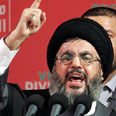
Hizbullah has been transporting rockets and heavy weaponry to Palestinian camps in south Lebanon just a few miles from the Israeli border, according to Lebanese officials.
The officials told WND the office of Lebanese Prime Minister Faud Sinora sent a letter last week to Abbas Zakir, the Palestinian Authority's most senior representative in Lebanon, outlining the alleged Hizbullah weapons transfers into Palestinian camps. The letter noted "unusual activity" in and near the Palestinian camps, including the coming and going of trucks suspected of carrying weapons.
Palestinian groups, including Fatah and the Popular Front for the Liberation of Palestine-General Command, maintain armed bases in Lebanon, mostly in the al-Naemeh province just south of Beirut and in the Bekaa Valley, near Lebanon's border with Syria and Israel. Fatah is the party of PA President Mahmoud Abbas.
The reports follow a WND article last month quoting Lebanese officials claiming Hizbullah, with the help of Iran, started building underground war bunkers in Lebanon's Palestinian camps.
During its 34-day confrontation with Hizbullah in Lebanon that began July 12, Israel destroyed scores of complex Hizbullah bunkers that snaked along the Lebanese side of the Israel-Lebanon border. Military officials said they were surprised by the scale of the Hizbullah bunkers, in which Israeli troops reportedly found war rooms with advanced eavesdropping and surveillance equipment they noted were made by Iran.
Vehicles clear furniture, equipment from outposts
A senior Lebanese official, speaking on condition of anonymity, told WND Hizbullah started building a new set of bunker systems, this time in Palestinian refugee camps.
"The Lebanese Army doesn't have the authority to patrol inside the camps," said the official. "Hizbullah knows it is safe there to rebuild their war bunkers, and they began doing so with Iranian help."
A second Lebanese official confirmed the information, which came one day after Israel's Army Radio reported Hizbullah was seen by the Israeli army dismantling 14 outposts near the border with Israel, removing rockets and equipment for transport.
According to Army Radio, Hizbullah members blocked entry to their outposts using bulldozers. Trucks then removed weapons and other munitions from the area. Vehicles also reportedly cleared furniture and equipment from the outposts.
'He who wants to weaken us is miscalculating'
The Lebanese Army and a contingent of several thousand international troops have deployed in South Lebanon. None of the forces are authorized to enter Palestinian refugee camps.
The Lebanese government has stated its army will not confront Hizbullah or work to disarm the group. An agreement reached with Hizbullah last month allows the Lebanese militia to retain its weapons as long as it doesn't display the arms in public.
The agreement is in violation of the UN ceasefire resolution that ended confrontations initiated when Hizbullah ambushed an Israeli patrol unit, kidnapping two soldiers and killing eight others. The resolution calls for the eventual disarming of Hizbullah.
During a Hizbullah "victory" parade in south Beirut last Friday, the group's leader, Hassan Nasrallah, declared Hizbullah possesses more than 20,0000 rockets aimed at Israel and pledged his group will quickly reestablish militant bases in Lebanon.
Making his first public appearance since the war started, Nasrallah drew loud applause from the crowd when he vowed: "We will rehabilitate the force and bases within a short period of time."
"The resistance today is stronger than it was on July 12," Nasrallah said. "He who wants to weaken us is miscalculating."
Israeli security officials did not deny Nasrallah's claims of continuing to maintain a large rocket arsenal.
An official pointed to a volley of 240 rockets fired by Hizbullah one day before last month's cease-fire was imposed, the largest number the group had launched in a 24-hour period. One Israeli civilian was killed in the attacks; 26 others were injured.
"The message sent is that Hizbullah absolutely maintains the capability of firing hundreds of rockets per day into Israel," commented the official. "Wasn't one of the (Israeli) military campaign's main goals to eliminate the rocket threat?"
Reprinted with permission of WorldNetDaily















